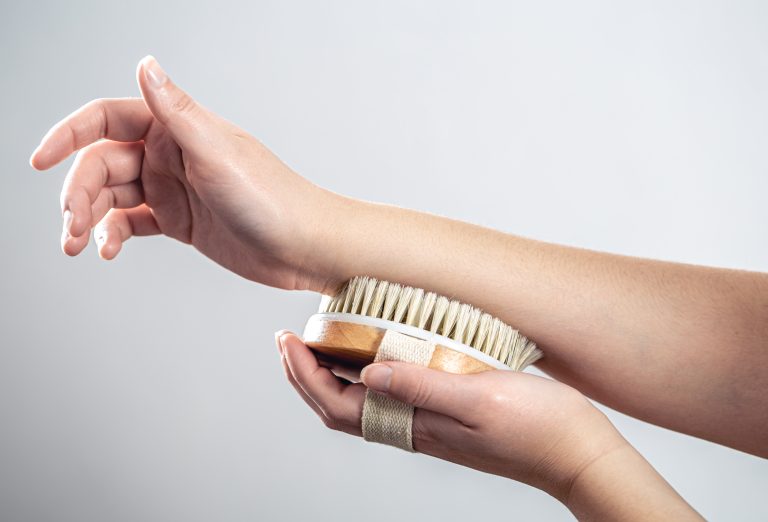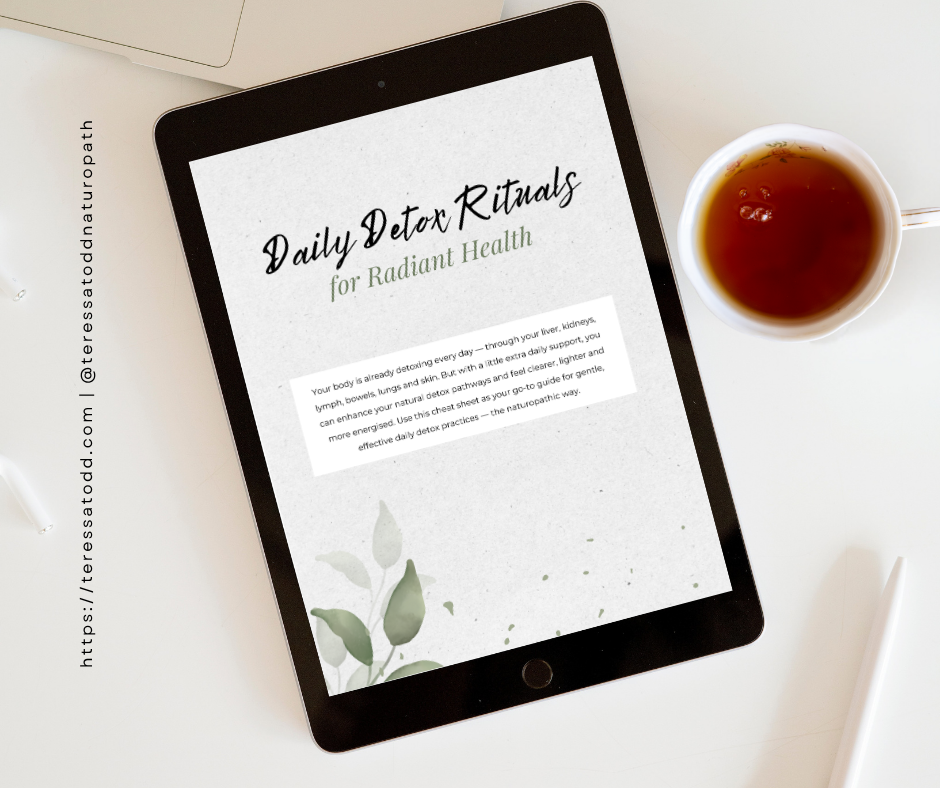Detoxing is a buzzword. You may have seen plastered all over social media – almost like a fad. But let’s talk about it in practical terms……
A ‘real detox’ doesn’t look like green juice, hunger, headaches and brain fog. It doesn’t involve starving your body, sitting on the loo all day, or relying on mystery powders from Instagram.
The truth is:
Your body is already detoxing — every single day.
Your liver, kidneys, lymph, lungs, gut and skin are working around the clock to process, filter, and eliminate toxins, hormones, chemicals, and byproducts from normal metabolism.
But here’s the kicker…
With today’s modern life — think stress, synthetic hormones, food additives, pesticides, wine o’clock, and not enough rest — that internal detox system can become overloaded.
Why Detox Matters
When your body’s detox systems are overwhelmed, you may notice symptoms like:
– Brain fog
– Fatigue
– Hormonal chaos
– Fluid retention
– Skin flare-ups
– And the dreaded ‘everything feels heavy’ feeling.
So, instead of crash diets or extreme detoxes, try these daily strategies.
Detox Is Nourishment, Not Punishment
From a naturopathic and biochemical perspective, detoxing involves supporting both Phase I and Phase II liver detoxification pathways — particularly glucuronidation, methylation, and sulphation.
When these pathways are supported, your body feels lighter, your energy returns and those hormonal symptoms start to ease.
Daily Detox Tools
- Eat Brassicas several times per week
Include a cup of lightly steamed broccoli, kale, cabbage, or Brussels sprouts each day. For extra oomph – add some mustard to help activation of the sulforaphane component of the Brassica family.
- Herbal Detox Tea
Brew a blend of dandelion root, nettle, calendula and peppermint. There are herbal detox combinations available in supermarkets and health food shops that can be included in your daily routine for support.
- Dry Skin Brushing
Stimulate lymphatic flow before showering using a dry skin brush. Gently brush toward your heart for a few minutes before your shower to activate circulation and lymphatic flow.

- Deep Belly Breathing
Deep breathing has been shown to help reduce stress and increase blood flow. Practice box breathing (breathe in to count of 4, hold it for 4, breathe out to count of 4 and hold for 4. Repeat the process for 1 minute)
- Castor Oil Packs (2–3x/week)
A naturopathic traditional remedy. Apply the castor oil to your liver area and then layer it with a hot bottle for 30–45 minutes.
- Warm Lemon Water
Add 2 teaspoons of lemon juice to about 50ml of warm water and drink it first thing in the morning.
- Include Sulphur-Rich Foods
Sulphonation is one of the liver detoxification pathways. Foods that can support this include onions, garlic, and eggs.
- Support Daily Bowel Movements
Regular bowel movements support the elimination of toxins. Increase fibre-rich foods such as whole grains, brown rice, vegetables, and fruits. Also use flaxseeds, magnesium, and water.
- Add Herbs and Spices
Herbs and Spices like Turmeric, Cinnamon, Coriander, Parsley Cumin, and Ginger can support detoxification and heavy metal elimination.
- Need more support – Take Targeted Nutrients
The detoxification pathways require specific nutrients such as Magnesium, B2, B6, B12, B9, zinc, amino acids, Vitamin C, Glutathione, Selenium, to name a few. Using these from foods or as a supplement can help support detoxification pathways. Professional advice is recommended before taking supplements.
Want the Ultimate Shortcut?

I’ve created a free Daily Detox Rituals to help you build these detox tools into your life — naturally and sustainably.
The Bottom Line:
Detox isn’t about deprivation — it’s about support…
Small steps create massive shifts when you give your body the nutrients, movement, and rhythm it needs to thrive.
If you’re feeling sluggish, bloated, or foggy, your body might be whispering: “Help me clear the path.”
Start gently. Start now. And know that you don’t have to do it alone.
With love, broccoli, and a dash of lemon,
Teressa
Naturopath + Biochemist
Ready to kick start Gut Health? Book a Call!

This is how gut microbes can influence weight!
Probiotics can help you gain weight or lose weight by interacting with our genetics, food and metabolism.
And yes, I did say lose or gain weight……..
Firstly, let me explain that the trillions of microbes in the gut need to be varied, meaning that there should be a large variety of species. There are many different species (or breeds) of microbes, and they all have their place in aiding health — the more variety and balance, the better health results.
Back to the weight loss or weight gain issue….
Do you eat yogurt and berries for breakfast? Thinking that it’s helping you lose weight?
Well, Lactobacillus acidophilus (like the species found in yoghurt) has been connected to weight gain.
I am not saying throw your yoghurt and berries in the bin. Instead, I am suggesting looking at the overall picture. If Lactobacillus acidophilus is the predominant micro-organism of the gut, then weight gain can result.
It is about the variety of species of gut microbes. Imagine if we only have trained german shepherd guard dogs in the world. It may be a safe world, but I am sure that other breeds may be more suitable as a family pet.
While Lactobacillus acidophilus is associated with weight gain, other Lactobacillus species correlate with weight loss.
Species like Lactobacillus plantarum, Lactobacillus gasseri, and Bifidobacteria animalis have been found to support weight loss.
Want to lose weight?
Look at your gut flora to support your goal.
Tests can be performed to identify the predominant species of the gut, and specific species can be utilised to support weight changes.
Want more information about your gut health?
Or want to look at all the factors contributing to weight gain, I’d love to be able to help.





